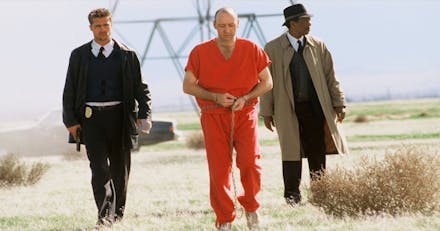Seven isn't just a movie, it's a mind fuck, a psychological trip through hell that leaves your head spinning, your heart pumping and your stomach crying out for the medicinal properties of a stiff whiskey, or five. Not since The Exorcist has there been a mainstream Hollywood studio movie as extraordinarily dark, bleak, intense, and as monumentally scary as this. From its sensory assaulting opening credits, through to its desolate and very shocking finale, Seven goes for the gut, and like an insidious gnawing in the pit of your stomach, it never lets up. Be warned, this is not comfortable viewing.
In an anonymous US city in which it always rains and nobody seems to have bothered to pay their electricity bill, a serial killer is busy slaying his victims according to the seven deadly sins: gluttony, greed, sloth, envy, etc, leaving a sick procession of corpses, each one murdered in a way related to their own particular sin: a wealthy defence lawyer is forced to cut off a pound of his own flesh (greed); an obese man is forced fed until his stomach explodes (gluttony); a prostitute (lust) is... well, best see for yourself. Assigned to the case are veteran cop William Somerset (Freeman), a methodical, world-weary thinker and a week away from retirement after 34 years on the force, and his hot-headed young new partner David Mills (Pitt), recently relocated, along with his wife (Paltrow), to this hellhole of a city, eager to make a name for himself. Try as they might they are always one step behind the murderer, but all too late his true motives are revealed to them.
Director David Fincher, who previously helmed the equally gloomy Alien3, creates an overwhelming sense of unease, presenting a world of irredeemable ugliness, a grim, melancholic, depressing, decaying society from which there is no escape. This movie even smells rank. But despite the gruesomeness of the crimes this is no slasher movie. In the same way that Manhunter relied on the psychological for its impact, so too does Seven. The victims are never killed onscreen. Instead, we catch glimpses of the corpses at the crime scene, or in the morgue, or in the snatches of black-and-white police photographs that are flashed before us. Perhaps more disturbingly, you are mostly left to visualise in your mind the full extent of the killer's atrocities when they are discussed, matter-of-factly, by Pitt and Freeman.
As the cops move closer to their foe (whose identity is revealed late and by then it doesn't really matter anyway since it's fundamentally irrelevant) the movie shifts from thriller territory into the realms of horror, and it's here that Fincher and screenwriter Andrew Kevin Walker pull off their greatest coup, a piece of cinematic genius - the most downbeat ending imaginable. Ever. You come away reeling, emotionally and mentally, shaken and most definitely stirred, muttering to yourself that they couldn't possibly have done that. But they did. Oh boy, did they. For the ending alone, this is simply unmissable.








.jpg?q=80&auto=format&w=150&ar=16:9&fit=crop&crop=top)